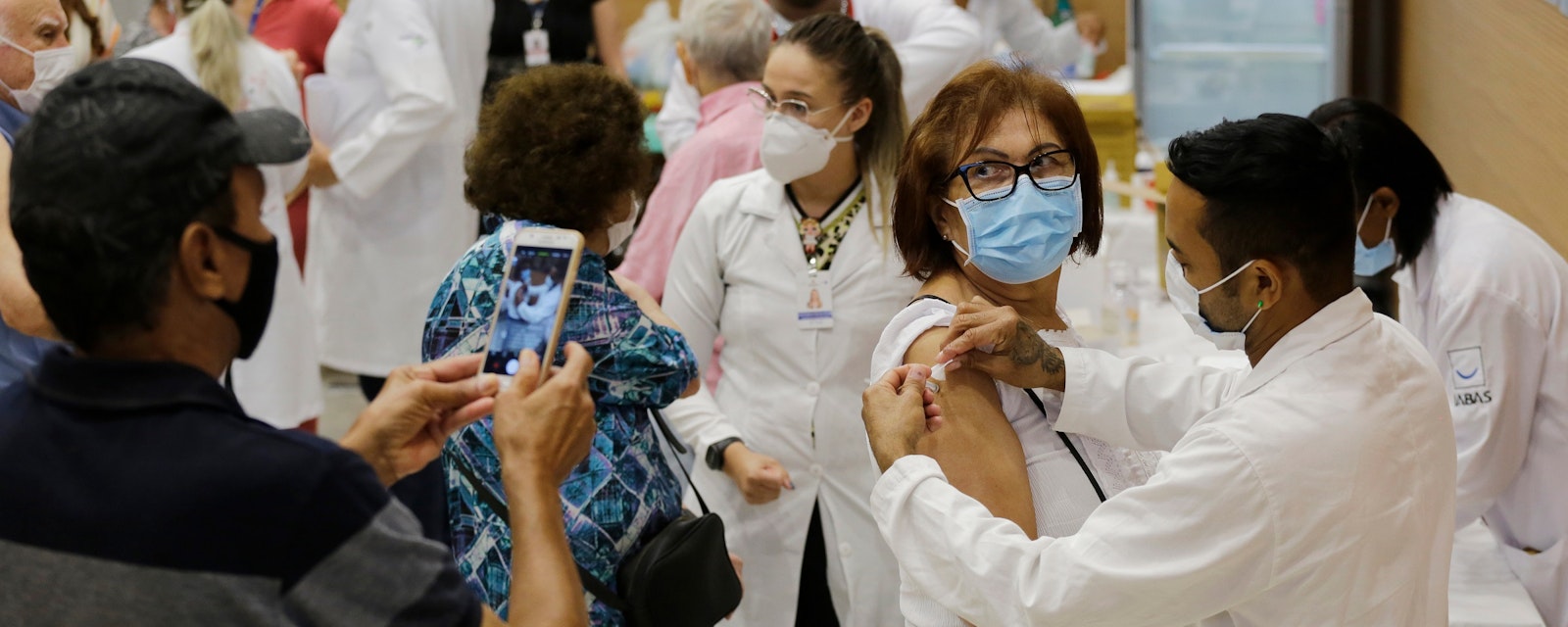Our Covid-19 vaccination table includes updated information on the immunization strategies selected EMs are pursuing and the challenges they face. Below are some of the latest developments. Please do not hesitate to contact us if you want to discuss any of the countries mentioned in more detail.
Click on 'View PDF' to see the table.
Highlights
Vaccine Rollout
- In Brazil, the Health Ministry is preparing the 2022 vaccination plan, including booster shots for everyone above 18 years old.
- Chile has administered 3.8mn third booster jabs since August; an initial study carried out locally shows that the booster jabs are helping prevent both transmission and hospitalization.
- Colombia’s health regulatory agency is expected to give the green light for the vaccination of 3-11 year olds, who total around 4mn people; the Sinovac and Pfizer vaccines would be used for this age cohort.
- India’s government is expecting to have administered 1bn vaccinations by mid-Oct, though most of these are first doses; as of 10 Oct, 267.6mn people (19.2% of population) were fully vaccinated.
- Media reports and official statements seem to indicate that vaccine hesitancy is starting to manifest in the Philippines and Indonesia despite these countries still being at the lower end of their vaccine targets.
- In Peru, 18 year olds are now eligible for their first vaccine dose in most of the country at the same time as booster jabs begin to be applied to 500,000 health sector workers.
- Vaccination progress in Russia is expected to pick up significantly in the coming few weeks as an increasing number of the country’s regions are introducing some form of compulsory vaccination.
- With 30mn (59% of the population) fully and 40mn (78%) partially vaccinated, South Korea is on course for its 70% herd immunity goal before November, with high school students now eligible for inoculation.
Vaccine Procurement
- India could obtain 1bn Pfizer doses by the end of 2022 provided the two parties can reach an agreement over indemnity clauses and India opts not to rely solely on domestically produced vaccines.
- Mexico’s state-owned vaccine manufacturer Birmex is expected to seal a production and packaging agreement with the Russian Direct Investment Fund (RDIF) that would allow Birmex to make up for delayed deliveries of the Sputnik vaccine; Birmex has capacity to produce 2mn Sputnik doses per month.
- Nigeria received a French government donation of 500,000 AstraZeneca vaccines in early October, and the National Primary Health Care Development Agency (NPHCDA) expects a regular COVAX shipment of 3.6mn Pfizer-BioNTech vaccines later this month.
- A total of around 195mn doses has been acquired by South Korea, while SK Bioscience has signed an agreement with the Coalition for Epidemic Preparedness Innovations (CEPI) to expand capacity reservations for manufacturing further vaccines.
Infections and New Variants
- In Argentina, where genomic sequencing capacity is limited, the Delta variant still only accounts for under 10% of cases, though its prevalence has increased rapidly in the last fortnight, and it is expected to be dominant within the next six weeks; travel restrictions and the vaccination campaign help explain why Delta has not spread more quickly.
- The fourth wave of the pandemic is picking up in Poland with the rolling seven-day average of new cases and deaths per day increasing by 49% and 39% respectively during the past week. Infection and death levels are expected to surge in the coming weeks.
- In total, 9,879 new cases were reported in South Korea in the week to 8 October and have now exceeded 1,000 for 98 consecutive days. With 518 ICU beds immediately available, the government issued an executive order to secure a further 146 critical care beds and over 1,000 beds for less severe cases. The Delta variant accounts for all new cases, with the positivity rate highest among the 30-39 age cohort.
Vaccine Diplomacy
- China's vaccine exports fell 21% in August from July in value terms, according to customs data, in a sign that countries that relied on Chinese-made vaccines when they were the only option are now shifting towards Western-made alternatives.
- Bangladesh, Nepal, Myanmar and Iran are among the first beneficiaries of India’s recent decision to lift its vaccine export ban, which was put in place in April amid a particularly severe second coronavirus wave.
- Russia is putting diplomatic pressure on the World Health Organization and the European Medicines Agency to approve its Sputnik V vaccine.
- South Korea is donating 1.1mn AstraZeneca doses to Vietnam and almost half a million to Thailand. Seoul also approved healthcare aid requests to North Korea but border restrictions make the delivery schedule unclear, while the government is also providing 10bn won (USD 8.4mn) for civilian organizations to undertake humanitarian aid to Pyongyang. The WHO has also begun shipping Covid-19 medical supplies to North Korea.
The views and opinions in these articles are solely of the authors and do not necessarily reflect those of Teneo. They are offered to stimulate thought and discussion and not as legal, financial, accounting, tax or other professional advice or counsel.




